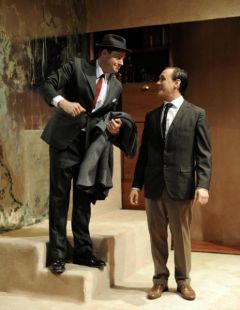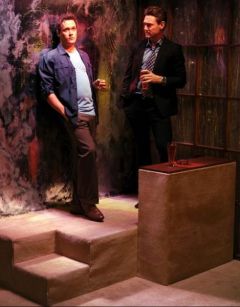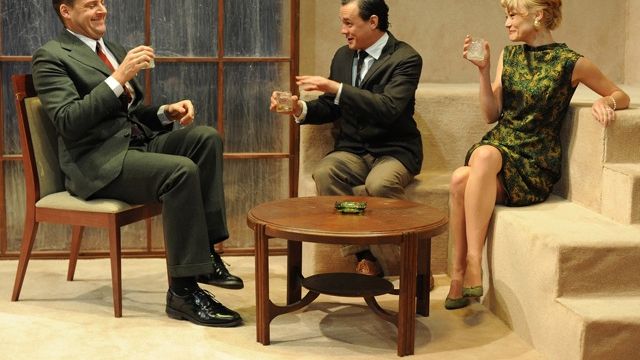The Pride
If you really want to see strong, powerful acting, then Red Stitch Actors Theatre will not disappoint. The Pride is a gripping tale of two gay men, and a woman, who are living in very different eras: the 1950s and the present day. Playwright Alexi Kaye Campbell first shows us two men who are drawn to each other but cannot be together because of society’s rules. Then the play takes an imaginative, and startling, turn into the 00s, where homosexuality is a lot more accepted, even celebrated. But that freedom comes at a price, too.

The play begins in the 50s, with married couple Phillip (Lyall Brooks) and his delightful wife Sylvia (Ngaire Dawn Fair) preparing to have a drink with a male friend of Sylvia’s, Oliver (Ben Geuerens) at their home. It’s like a scene from Mad Men, as Phillip pours drinks from a crystal decanter for Oliver, and engages in light-hearted banter with him, but there is a tension there. As the scene continues, Oliver puts his hand, casually, on Phillip’s knee and there is a glimpse of Phillip’s anguish. Brooks gives a terrifically brave and nuanced performance as the repressed Phillip, a man who refuses to accept his homosexuality, in line with the attitudes of the times he lives in. Geuerens matches him as the passionate Oliver, who wants to live honestly, according to the wishes of his heart, and that means being with Phillip.
The play jumps forward to the present, where the modern-day Oliver is waiting at home for the arrival of a male escort. His boyfriend, Phillip, has just walked out on him, having finally tired of Oliver’s string of affairs. It sounds impossible to put these two scenes together, and get the actors to play the same roles in two different eras, but this production blends the two eras beautifully. The transitions from the 50s scenes to the present day scenes are stunning. In one scene, an actor walks on in a Nazi uniform (Ben Prendergast) and looks around, and there’s a collective gasp from the audience. But he isn’t what he seems, and the play switches into the present day.
 The real heart of this play is the relationship between Phillip and Oliver, and how it’s affected by different periods in time. In the 1950s scenes, Oliver makes a passionate plea to win Phillip’s heart, and bring him out of the closet. Phillip is cruel to Oliver, and then puts himself through a gruelling and cruel treatment to “cure” homosexual urges. The play makes the point that no cure, or society, can crush the feelings that people hold in their hearts.
The real heart of this play is the relationship between Phillip and Oliver, and how it’s affected by different periods in time. In the 1950s scenes, Oliver makes a passionate plea to win Phillip’s heart, and bring him out of the closet. Phillip is cruel to Oliver, and then puts himself through a gruelling and cruel treatment to “cure” homosexual urges. The play makes the point that no cure, or society, can crush the feelings that people hold in their hearts.
The Pride has a serious story to tell but the 50s scenes give way to a more hopeful, joyous future for couples like Phillip and Oliver. Special mention also goes to Ngaire Dawn Fair, who is excellent as the wife (in the 50s) and the straight girl (in the present day), caught between these two men. The scene where she confronts Oliver over his betrayal of her is so real, and moving.
Sara Bannister
Images: Lyall Brooks, Ben Guerens & Ngaire Dawn Fair and Lyall Brooks & Ben Guerens.
Subscribe to our E-Newsletter, buy our latest print edition or find a Performing Arts book at Book Nook.

